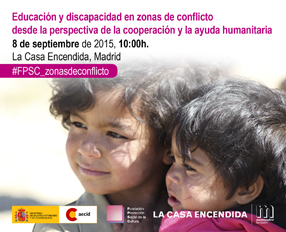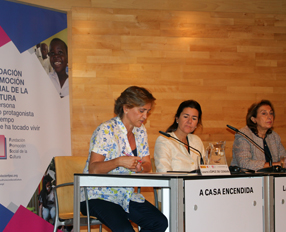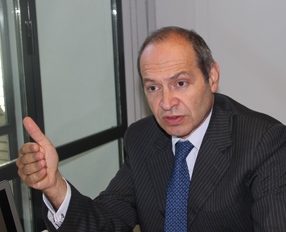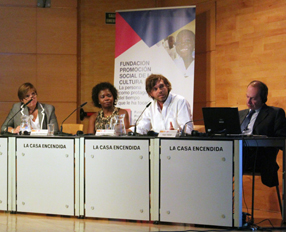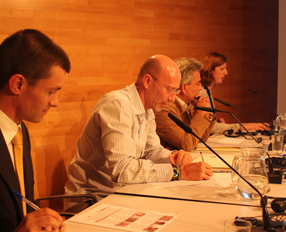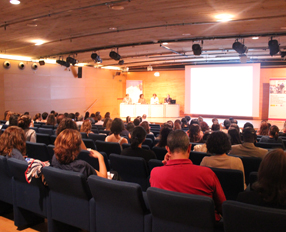Coinciding with the Aid Worker Day on 8 September, the FPSC has organized the seminar “Education and Disability in Conflict Zones from the perspective of cooperation and humanitarian aid” in La Casa Encendida in Madrid, with the funding of the Spanish Agency for International Development Cooperation (AECID). The seminar aimed to investigate the negative effects of current armed conflicts in the situation of people with disabilities and in the education of children, the search for best practices and ideas for effective humanitarian action and investment in development as a means to achieve peace, and the analysis of the situation and the rights of children and persons with disabilities in conflict zones.
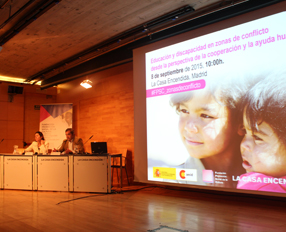
Armed conflicts have a high human cost for children and their education, with children without school, school closures, death and injuries, forced recruitment and traumatic situations such as among people with disabilities whom experience higher exposure to gun violence as result of their exclusion from education and employment, the need for personal assistance in their daily life, social stigmatization, discrimination and physical and social barriers.
In the opening session of the Seminar, Laura Lopez de Cerain, Director of Multilateral, Horizontal and Financial Cooperation of the Spanish Agency for International Development Cooperation (AECID), participated and stressed that education is a priority in humanitarian aid, emphasizing that the condition of refugee of a person does not diminish their right to education.
Jumana Trad, President of the FPSC, said that more than 90% of the victims in today’s conflicts are civilians, and the devastating effect of these results in lives cut short, and cited conflicts in Syria and RD Congo with about 13 million children out of school.
The General Director of the FPSC, Maria Beamonte, closed with her speech the opening session presenting the contents of the tables and encouraging participation.
This was followed by a session on “Education in conflict areas” which was attended by Fady Yarak, General Director of Education at the Ministry of Education in his country, which offered the fact that the refugee population in Lebanon amounts to a million and a half refugees, a quarter of the total population.
In Lebanon there are more than 400,000 refugee children, 26% from a total of 106,795, are in school, thanks to a major effort of the whole nation.
The challenge they face is access to water, sanitation, transportation to schools, classroom equipment and furniture, rehabilitation of schools and to reach most vulnerable children.
Louise Lalu Dimandja, Doctor, Masters in International Public Health and collaborator with HARAMBEE and FPSC for development in DRC, said the deplorable situation in which education is in her country where schooling is not compulsory and there is serious lack of resources for schooling. She stressed the idea that without education, development is not possible.
Pablo Funes Herrera, Head of the Africa Department and the Humanitarian Aid Foundation in Entreculturas closed with his intervention this session. He presented the situation of South Sudan, and stressed that education is a fundamental right, catalyst for many other rights, but vulnerable in conflict situations, being fundamental to humanitarian action. Education prevents the recruitment of young people by armed factions, against sexual violence, etc.
Macarena Cotelo, Director of International Cooperation Department of the FPSC, moderated the table.
This was followed by the session “Disabilities in Conflict Zones”, moderated by Enric Roig, Director of the FPSC Department of Humanitarian Aid. It intervened Maria Kett, Deputy Director in the Leonard Cheshire Disability & Inclusive Development Center, England, Georges Xanthopoulos, Director of Mobility and Employment Arcenciel, Lebanon, and Antonio Menendez, Protection Cluster Coordinator in the Palestinian Territories and Officer of the High Commissioner for Human Rights.
Mary Kett explained that there is a need to establish stronger links between emergency situations and subsequent long-term development, with financial and human resources.
Georges Xanthopoulos Georges Xanthopoulos warned of the importance of creating specific legislation for the disabled, as in the case of Lebanon, to move towards an inclusive approach to rights.
Antonio Menéndez reported that the movement of people with disabilities in situations of conflict is very complicated, he provided information on the situation of disability in the Palestinian Territories where 7% of the population is disabled, 90% of disabled people have no employment and a high number does not leave their homes to avoid the widespread negative attitude towards them.





